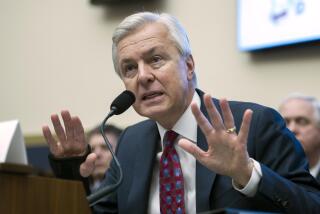Massachusetts Calls for Fine, Reform by CSFB
- Share via
NEW YORK — Massachusetts securities regulators are demanding that Credit Suisse First Boston pay a fine of at least $100 million and clearly separate its stock research from investment banking to settle the state’s civil investigation of the firm’s practices, sources said Thursday.
Separately, the U.S. attorney in Manhattan has sent a letter to Massachusetts officials requesting documents from their CSFB probe, sources said--an indication that federal criminal prosecutors are looking more closely into alleged conflicts of interest on Wall Street.
Though civil investigations have garnered more attention, James Comey, the U.S. attorney for the Southern District of New York, reportedly has been studying whether brokerage conduct rose to the level of criminal wrongdoing.
His request for information was discussed Thursday during a conference call among state securities regulators. A spokesman for Comey had no comment.
Meanwhile, Massachusetts’ demands for restitution and reforms by CSFB could complicate efforts to arrange a universal settlement between major brokerages and state and federal regulators to end their various probes.
The Securities and Exchange Commission, under Chairman Harvey L. Pitt, has sought to broker a universal settlement. But state regulators have worried that Pitt wouldn’t be tough enough in forcing industry reforms.
In their settlement talks with CSFB, Massachusetts regulators have insisted that the firm consent to a penalty of at least $100 million, to be paid to Massachusetts and other states, sources said. That is the amount Merrill Lynch & Co. paid this year to end a similar probe by New York.
Regulators have been investigating allegations of widespread misconduct by brokerages during the bull market. The allegations include that brokerages gave executives of favored clients shares in hot new stock deals, and that analysts routinely recommended stocks solely to curry favor with the companies’ executives.
Massachusetts has gathered a number of e-mails in which CSFB analysts indicated they felt internal pressure to hype stocks of CSFB investment banking clients.
The e-mails and other documents have spurred calls for brokerages to completely separate research from investment banking. But industry officials and regulators have differed on how to best achieve a genuine separation.
Massachusetts officials have demanded that CSFB’s parent, Credit Suisse Group, create a subsidiary into which it would transfer its research unit, sources said. The firm also would have to implement other measures, such as having the parent company rather than the banking department fund research.
The state’s settlement demands were outlined in a call Wednesday morning between Massachusetts regulators and their counterparts in about two dozen states.
However, CSFB later balked at the requirement that research be sequestered in a separate subsidiary and the talks have bogged down over that point, sources said.
Brian McNiff, a spokesman for Massachusetts Secretary of State William Galvin, declined to comment.
At CSFB, a spokeswoman said: “We cannot comment on any discussions we may or may not be having with regulators and state officials. But as we’ve said, we continue to cooperate with all government officials and regulatory authorities on these matters.”
Though state and federal regulators recently joined forces to negotiate a unified settlement with Wall Street, they have yet to agree on a consensus set of demands.
The talks between CSFB and Massachusetts are aimed at resolving the probe by that state in conjunction with other states. Any deal also could be incorporated into a global settlement, if one is reached.
Massachusetts’ Galvin has said any settlement would have to clearly wall off research from investment banking. Among other demands, Massachusetts wants Credit Suisse’s compliance and legal department to oversee stock research. Also, investment bankers could not order the hiring or firing of analysts, nor have input in performance reviews of analysts. And CSFB could not promise research coverage when it is seeking banking work from companies.
As the SEC and state regulators have pursued civil cases to force Wall Street reform, a big question has been whether criminal prosecutors also might seek to charge individuals or firms.
It isn’t clear whether U.S. Atty. Comey’s interest in the investigations could delay efforts to reach a universal settlement.
Massachusetts last month recommended that New York Atty. Gen. Eliot Spitzer consider filing criminal charges against CSFB under a state law that gives prosecutors great leverage in bringing criminal fraud cases against securities firms.
More to Read
Inside the business of entertainment
The Wide Shot brings you news, analysis and insights on everything from streaming wars to production — and what it all means for the future.
You may occasionally receive promotional content from the Los Angeles Times.










